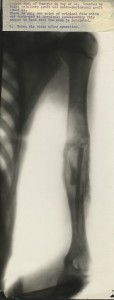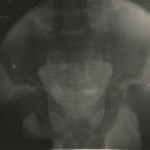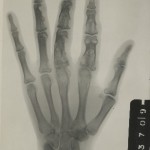Henry Mulrea Johnston was born in County Down, Ireland in 1877 and studied medicine at Queen’s College, Belfast graduating in 1903. He went on to study and work at Trinity College, Dublin before moving to London in 1910 where he worked at St Bartholomew’s and Great Ormond Street Hospitals and became a fellow of The Royal College of Surgeons in 1911. In 1912 he was appointed Resident Medical Officer at The Royal Victoria Infirmary in Newcastle.
During WWI he joined the RAMC and was posted to a hospital in Sidcup where he concentrated his efforts on deformities of the face. Prior to joining the army he had been committed to research using the latest radiological techniques for diagnostic purposes, something that was evident in his research for many years. An image in an article from the British Dental Journal demonstrates some of the pioneering work that Johnston was involved in whilst at Sidcup and it is also possible that it is Johnston who is pictured on the right of the picture. http://www.nature.com/bdj/journal/v217/n6/full/sj.bdj.2014.820.html

HOSP/STAN/10/1/30/3
Following the war he was also appointed Visiting Surgeon to Stannington Children’s Sanatorium, a role which he carried on until 1945. In his obituary from the British Medical Journal it is remarked that “In general surgery he loved to demonstrate bone tumours and cysts and to illustrate his cases with beautiful radiographs of his own taking.” Amongst the records of Stannington Sanatorium we have a selection of photographic copes of some of Mr Johnston’s x-rays reflecting some of his interests outside of the Sanatorium. The collection of images shows patients of varying ages with different skeletal deformities, most of which appear to be unrelated to tuberculosis.

HOSP/STAN/10/1/24/1

HOSP/STAN/10/1/21/1
Click on images to enlarge
Sources: ‘Henry M. Johnston, F.R.C.S’, British Medical Journal, Vol. 2, No. 4724, 21 Jul 1951, pp. 181-182
British Dental Journal http://www.nature.com/bdj/journal/v217/n6/full/sj.bdj.2014.820.html [24 Nov 2014]
